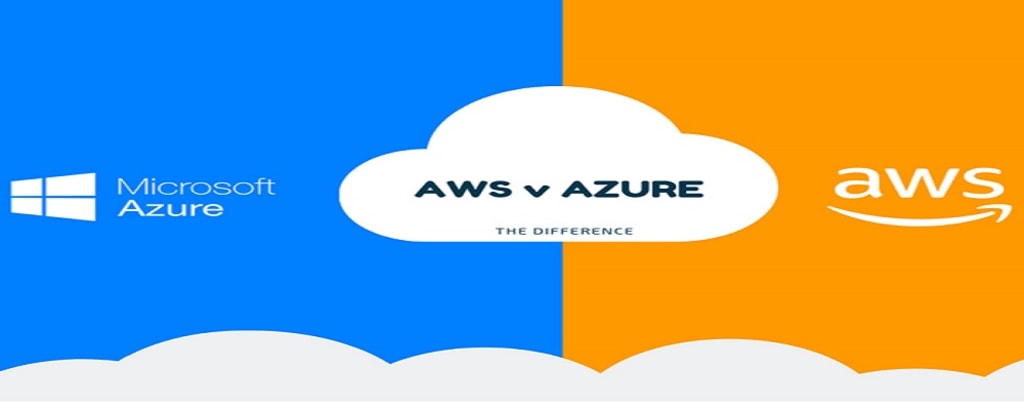What Distinguishes Amazon Web Services (AWS) from Microsoft Azure?
What is the Difference Between Microsoft Azure vs Amazon AWS?

In the realm of cloud computing, Amazon Web Services (AWS) and Microsoft Azure stand out as two giants that dominate the market. These cloud computing platforms offer a wide array of services to individuals, businesses, and organizations seeking to harness the power of the cloud. However, despite their similarities, there are distinct differences that set AWS and Microsoft Azure apart. In this article, we delve into the key differentiators that make these two cloud platforms unique.
Origins and Background
Amazon Web Services (AWS): AWS, launched in 2006, is widely regarded as the pioneer of cloud computing. Born out of Amazon's internal infrastructure needs, AWS quickly expanded to offer a range of cloud services to external customers. Its early entry into the market allowed it to build a vast ecosystem and establish itself as a frontrunner.
Microsoft Azure: Azure, introduced in 2010, is Microsoft's response to the growing demand for cloud services. Leveraging its expertise in software and enterprise solutions, Microsoft entered the cloud space with Azure, aiming to integrate seamlessly with its existing software products and services.
Market Share and Adoption
AWS: Amazon's early-mover advantage and its extensive service offerings have allowed AWS to secure a significant share of the cloud market. As of my last knowledge update in September 2021, AWS held around 32% of the market share.
Azure: Microsoft's strong enterprise relationships and its integration with popular tools like Microsoft Office and Windows Server have propelled Azure's adoption, securing it a solid 20% of the market share as of September 2021.
Service Offerings and Specializations
Both AWS and Azure provide a wide range of services, including computing power, storage, databases, machine learning, analytics, and more. However, each platform has its own strengths and areas of specialization:
AWS: AWS is known for its vast selection of services, ranging from basic infrastructure offerings like EC2 (Elastic Compute Cloud) to more specialized services like Amazon Redshift for data warehousing and Amazon SageMaker for machine learning. Its extensive service catalog appeals to startups, enterprises, and industries of all kinds.
Azure: Microsoft has leveraged its software expertise to create seamless integration between on-premises solutions and cloud offerings. Azure's strength lies in its integration with Windows-based systems, Active Directory, and familiar Microsoft tools like Microsoft 365. This makes it a popular choice among enterprises already invested in the Microsoft ecosystem.
Global Infrastructure
AWS: One of AWS's distinguishing features is its extensive global network of data centers. With regions spread across the world, AWS offers high availability and low latency to customers in various geographical locations.
Azure: Microsoft Azure boasts a similarly extensive network of data centers, strategically positioned to offer a global reach. Azure's data centers are known for their reliability and scalability, making it suitable for organizations with diverse geographic needs.
Pricing Models
Both AWS and Azure offer flexible pricing models, including pay-as-you-go, reserved instances, and spot instances for cost optimization. However, there are some differences in their pricing structures:
AWS: AWS is often praised for its detailed pricing documentation and a wide range of pricing options. This allows customers to select the most cost-effective option for their specific needs.
Azure: Azure's pricing structure is designed to be straightforward, but some customers have noted challenges in estimating costs due to the complexity of certain services. Microsoft has been working to improve transparency and make pricing information more accessible.
Ecosystem and Integrations
AWS: With its head start in the market, AWS has built a vast ecosystem of partners, third-party integrations, and a thriving marketplace of pre-built solutions that cater to a wide array of industries and use cases.
Azure: Microsoft Azure benefits from its close ties to the Microsoft software ecosystem. This makes it a strong choice for enterprises looking to seamlessly integrate their existing Microsoft software with cloud services.
Learning Curve
AWS: Some users have found AWS to have a steeper learning curve due to the sheer breadth of its service offerings and the multitude of configuration options available.
Azure: Azure is often considered more user-friendly, especially for organizations already familiar with Microsoft technologies. Its integration with familiar tools can help reduce the learning curve for teams transitioning to the cloud.
Innovation and Future Outlook
Both AWS and Azure are consistently innovating and expanding their service portfolios. AWS has a reputation for often being at the forefront of introducing new and cutting-edge services, while Azure's integration with Microsoft's software suite positions it well for catering to evolving enterprise needs.
In conclusion, Amazon Web Services and Microsoft Azure are two of the most prominent cloud platforms available today. While they share many similarities in terms of service offerings, their origins, specializations, integrations, and even learning curves set them apart. The choice between AWS and Azure largely depends on an organization's existing technology stack, preferences, and requirements. As the cloud computing landscape continues to evolve, both AWS and Azure are likely to remain central players, driving innovation and shaping the future of technology.





Comments (1)
Nice story you can also read the one I have prepared for you